Index relies entirely on the support of donors and readers to do its work.
Help us keep amplifying censored voices today.
Index on Censorship recently appointed a new youth advisory board who attend monthly online meetings to discuss current freedom of expression issues and complete related tasks. As their first assignments they were asked to provide a short bio to introduce themselves, along with a photograph of them holding a quotation highlighting what free expression means to them.
Simon Engelkes 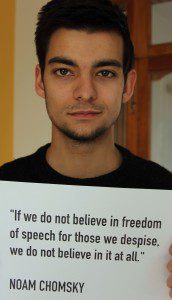
I am from Berlin, Germany, where I study political science at Free University Berlin. I have worked as an intern with Reporters Without Borders and RTL Television, which made me passionate about the importance of freedom of speech.
I believe that freedom of expression forms an important cornerstone of any effective democracy. Journalists and bloggers must live without fear and without interference from state or economic interests. Unfortunately, this is not the case. Journalists, authors and everyday citizens are imprisoned or killed by radicals, state agencies or drug cartels. Raif Badawi, James Foley, Khadija Ismayilova, Avijit Roy – the list is endless.
We need to remind ourselves and the powerful of today, that freedom of expression as well as freedom of information are basic human rights, which we have to defend at all costs.
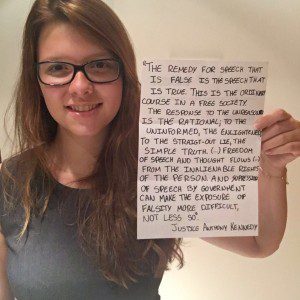 Mariana Cunha e Melo
Mariana Cunha e Melo
I am from Rio de Janeiro, Brazil. I graduated from law school in Rio and I have a degree from New York University School of Law. My family has taught me about the dangers of censorship and dictatorship, so I have always been interested in studying civil rights. This was the main reason I decided to study law.
I grew up listening to stories about the media censorship in Brazil during the military dictatorship. The fight against the ghost of state censorship has always sounded very natural to me – and, I believe, to all my generation. When I finished law school I found out that the new villain my generation has to face is the censorship based on constitutional values. The argument has changed, but the censorship is not all that different. So I decided to dedicate my academic and my professional life as a lawyer to fight all sorts of institutionalised censorship in Brazil.
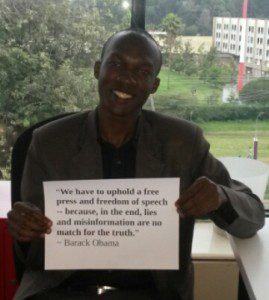 Ephraim Kenyanito
Ephraim Kenyanito
I was born and raised in Kenya, and I am currently working as the sub-Saharan Africa policy analyst at Access Now, an international organisation that defends and extends the digital rights of users at risk around the world. My role involves working on the connection between internet policy and human rights in African Union member countries. I am an affiliate at the Internet Policy Observatory (IPO) at the Center for Global Communication Studies, University of Pennsylvania. I also currently serve as a member of the UN Secretary General’s Multi-stakeholder Advisory Group on internet governance.
The reason why I have always been passionate about protecting the open internet is that it is a cornerstone for advancing free speech in the post-millennium era and there is a great need to build common ground around a public interest-oriented approach to internet governance.
Emily Wright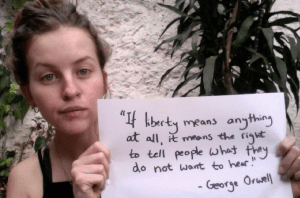
I grew up in Portugal, and I am now based between London and Bogotá, Colombia. I am a freelance filmmaker and journalist. Working in documentary production and community-based, participatory journalism informed a growing interest in journalistic practices, freedom of expression and access to information.
I believe that one of the greatest threats to freedom of expression is the flagrant violation of civil liberties under the banner of national security. The war on terror, underscored by Bush’s declaration “You’re either for us or against us”, has collapsed the middle ground, suppressing any struggles that challenge that statement. Freedom of expression has become a pretext for silencing those who have the least access to it; those who do not fall in line with the global order’s supposed defence of freedom against barbarism and obscurantism.
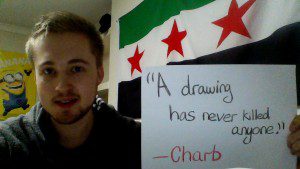 Mark Crawford
Mark Crawford
I’m originally from Birmingham, and now a postgraduate student at University College London, specialising in Russian and post-Soviet politics. This has inevitably educated me on the pressures exerted upon freedom of expression in Russia, whose suffocated and disenfranchised opposition journalists I am currently investigating.
Hostility to free expression has become a staple of my university life. Rather than developing a coherent set of ideologies to challenge toxic values in the open, it has become mainstream for students of the most privileged universities in the world to veto them on behalf of everyone else, no-platforming and deriding free speech.
I am convinced that there is no point fighting for an egalitarian society if any monopolies over truth are permitted. Freedom of speech is, therefore, something I am keen to promote in whatever small way I can.
Madeleine Stone 
My home is in south-east London but I spend most of my time in York, studying for my bachelor’s degree in English and related literature. I am currently the co-chair of York PEN, the University of York’s branch of English PEN, and a founding member of the Antione Collective, a human rights-focused theatre company.
Studying literature from across the globe has introduced me to issues of freedom and censorship, and the devastating effects censorship can have on national progress. Freedom of expression on campuses is hugely important to me as a student and it is currently under threat. Well-meaning individuals are shutting down the open debate that is vital to academic institutions. The only way to fight harmful ideas is to engage them head-on and destroy them through academic debate, not to ban them.
Layli Foroudi 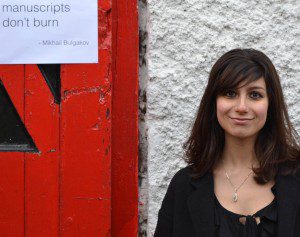
I am a journalist and student currently studying for a MPhil in race, ethnicity and conflict at Trinity College Dublin. It was studying literary works from the Soviet period during my undergraduate degree in Russian and French at University College London that initially highlighted the issue of censorship for me. The quote I selected, “manuscripts don’t burn”, is from the book Master and Margarita by Russian author Mikhail Bulgakov. He wrote about the hardship that many writers faced as they had to adjust their own writing in accordance with the authority, as well as the fact that not all that is written can be taken to be true.
I think that these themes are very relevant today. Whether people are censored or self-censor out of fear of punishment or of being wrong, limiting freedom of expression results in loss of debate, of exchange and of creativity. Being denied freedom of expression is being denied the right to participation in society.
 Ian Morse
Ian Morse
I have been involved in journalism since I began studying at Lafayette College, Pennsylvania, USA, and have been engaged in press freedom and reporting in three countries since then. I studied in Turkey last spring, where I interviewed and wrote about journalists and press freedom. It motivated me to begin researching and writing on my own about these topics. Now, as I study for a semester in Cambridge in the UK, I continue to talk about and advocate for free speech and press.
I find it absolutely amazing the power words and information can have in a society. It becomes then extremely damaging to realise that some things cannot be published because they conflict with those in power. Free speech is now becoming a hot topic around the world, particularly among youth, and it makes it all the more important to be able to approach freedom of expression critically and objectively.
Russia’s media freedom has declined under the government of Vladimir Putin. The president and his allies have used a cloak of legislative legitimacy to target potential opposition to his rule. Mapping Media Freedom correspondents Ekaterina Buchneva and Andrey Kalikh explore what this means for two important sectors of the Russian media.
By Ekaterina Buchneva, Mapping Media Correspondent
Under Russia’s law on mass media amended in autumn 2014, foreign owners are restricted to 20% of shares in media organisations in the country. Its authors said that the legislation would halt the West’s “cold information war”. The law has triggered major changes in the Russian media market and, as critics warned when the law was passed, was used to replace international investors with locals loyal to the Kremlin.
The Russian edition of Forbes magazine, formerly owned by German media conglomerate Axel Springer and known for its independent editorial policy, was sold to businessman Alexey Fedotov, who immediately said that the publication was “too focused on politics” and should cover more business news. In January 2016, the magazine named Nikolay Uskov as its new editor-in-chief. Uslov, a former editor-in-chief of the Russian edition of GQ, has never worked in business journalism.
Finland’s Sonoma Independent Media, America’s Dow Jones and the UK’s Pearson also had to sell their shares in Vedomosti, the main business newspaper known for its critical opinion pieces. Now the paper’s new — and only — owner is Demian Kudryavtsev, a business partner of oligarch Boris Berezovsky, who died in 2013, and a former chief executive of major Russian publishing house Kommersant. Kudryavtsev also purchased The Moscow Times, the country’s only English-language daily. Some journalists were concerned about the origin of the money Kudryavtsev used in the deal and suggested that there was another buyer behind him.
The media ownership law also affected a number of glossy magazines, which, as one of the law’s author said, “squeeze articles favorable to the West and the fifth column in between news about cars and glamorous watches”, and entertainment television channels. CTC Media sold 75% of its shares to loyal to the Kremlin oligarch Alisher Usmanov, who also owns the Kommersant publishing house.
The Russian broadcasters of CNN, Cartoon Network and Boomerang, as well as 11 television channels of Discovery group, came under the control of Media Alliance, 80% of which belongs to National Media Group. The president of NMG, which also owns a number of Russian media organisations, including RenTV, Channel Five, Izvestia newspaper and 25% of Сhannel One, is Kirill Kovalchuk, a nephew of Putin’s old friend Yuri Kovalchuk.
Tightening control over foreign publishers
In addition, in December 2015, another bill with new amendments to the “law about mass media” was introduced into the Russian State Duma. It contains more limitations for media organisations, some of them refer to foreign publishers.
The bill suggests new legal background — violation of anti-extremism legislation — for denying or revoking distribution permit for foreign publishers. Among the ones that now have such permits are Frankfurter Allgemeine Zeitung, China Daily, European Weekly, GQ, Cosmopolitan, Esquire, Tatler, Vogue, and some papers from CIS (Commonwealth of Independent States) countries, including Expert.Ukraine magazine.
“The problem is vagueness and inconsistency of the anti-extremism legislation itself and the practice of its implementation by the Russian authorities,” says Damir Gainutdinov, lawyer of Inter-regional Association of Human Rights Organisations “Agora”.
“It is primarily about Article 1 of the Federal Law on Countering Extremist Activity, which gives a definition of extremism, extremist materials, etc. In practice, this definition is used not only for hate crimes but also, for example, criticism of the Russian authorities. Condemnation of the Crimea annexation is recognised as calls for infringement of the territorial integrity of Russia, as it was in the case of Rafis Kashapov (Tatar activist from Tatarstan, who was convinced in September 2015 to three years in jail for posting informational materials criticising Crimea annexation), and criticism of the United Russia is recognised as the incitement of hatred to a social group, as it was in the case of prohibition of video clips by Navalny (a few activists were found guilty of distribution of extremist materials for posting a video by opposition leader Alexey Navalny titled ‘Let’s recall manifest-2002 to crooks and thieves’, on social media). Therefore, any unenthusiastic article published by foreign media may be recognised as a violation of anti-extremist legislation. Another thing is that this applies only to the print media. Since February 2014, it works much easier with websites; they can be just blocked by orders of the general prosecutor office.”
According to the bill, the foreign publishers also will have to pay a fee for issuing a distribution permit. The authors explained that it would “eliminate the unfair advantage of the founders of foreign publications that provides them with more favorable business conditions”.
Another bill, that was already approved by the State Duma, requires Russian media organisations to inform Roskomnadzor (The Federal Service for Supervision in the Sphere of Telecom, Information Technologies and Mass Communications) about foreign funding, including funding from foreign states, international organisations and Russian NGOs that were considered “foreign agents”. The minimum amount of money that should be declared is 15,000 roubles (less than $200). Penalties for not notifying Roskomnadzor will be fines of 30-50,000 roubles (about $400-600) for officials and the amount of money received for companies. A repeated violation will be punished with a fine of 80,000 roubles (about $1,000) and triples amount of money received.
This bill resembles the one adopted in June 2012 by the Russian State Duma, requiring NGOs to register as “foreign agents”, says Damir Gainutdinov. “First, it is a simple registration and then more and more new burdens will be introduced, for example, state bodies will deny accreditation of such media organisations, officials will be banned from giving them interviews and answering their questions … An additional mandatory audit and special checks of staff could be introduced, who knows what else.”
The bill about foreign funding could affect a number of media platforms – from Colta.ru that cover art and culture to Mediazonа that highlights problems of the Russian justice and the penal system.
Limitations for founders of media organisations
Another block of amendments introduces a new restriction for media founders. It suggests that those, who have unspent or unexpunged convictions for crimes against the constitutional order, public security and public safety, can not found a media organisation.
Those crimes include a number of criminal articles – from hooliganism and repeated violation of rules of organising or holding rallies and demonstrations to espionage and treason. But the most tricky ones are incitement of hatred and abasement of human dignity (Article 282 of the Criminal Code of Russia), public calls for extremism (Article 280) and public calls for infringement of the territorial integrity of Russia (Article 280.1), says Damir Gainutdinov. “These articles are used for persecution of dissenters. In absolute numbers, there are not many cases like this against journalists, but such practice is developing gradually – Stomaknih, Yushkov, Kashapov”.
However, these limitations could not prevent dissenters from taking part in media management at different positions. For example, Pussy Riot members Nadezhda Tolokonnikova and Maria Alekhina, who were convinced for hooliganism, founded Mediazona platform, but as Tolokonnikova told RBC newspaper, they were not officially registered as founders as they had foreseen possible legal problems.
By Andrey Kalikh, Mapping Media Correspondent
Russia’s environment for freedom of expression on the internet has declined precipitously since 2002 when the law on Counteracting Extremism was adopted. The definition of extremism used in the law is vague and overly broad, according to Aleksandr Verkhovski, an expert on extremism from the SOVA Information and Analytical Centre in Moscow. Verkhovski said that the law was written to keep independent media, oppositional political parties, and “not official” religious confessions under control.
In 2012, the anti-extremism law was amended to empower Roskomnadzor, the state media and communication watchdog, to launch the United Register of Banned Websites. The modifications also enabled the agency to add websites that have “extremist content” without judicial approval. Once a site is added to the list, Russia’s internet services providers are obliged to block it. Within days of the changes, several independent media outlets and political opposition sites websites and blogs — Grani.ru, Ej.ru, Alexei Navalny’s blog — were blacklisted in the country.
On 30 December 2015 a district court in the Siberian city of Tomsk sentenced blogger Vadim Tyumentsev to five years in prison for two videos he posted on his YouTube page.
In the first video, the blogger criticised the local government’s decision to raise the cost of fares on the city’s public transport. In the second video, he said that authorities help refugees from eastern Ukraine more than they help local residents.
The court recognised both of Tyumentcev’s videos as “having extremist character”. Ekaterina Galyautdinova, the presiding judge, gave Tyumentsev a sentence even longer than the prosecutor had pursued. She also banned Tyumentsev from posting online for three years.
The Tyumentcev case is far from the first time that a blogger has been subjected to a prosecution. In 2007, Savva Terentyev, a blogger from the Siberian city of Syktyvkar, was sentenced to a large fine for “offending a social group” – in this case, the local police force – by writing about bad behaviour and human rights abuses committed by officers. In 2012, Maxim Efimov, a blogger from Petrozavodsk, Republic of Karelia, faced prosecution after he posted an article under the headline.
In 2012, Maxim Efimov, a blogger from Petrozavodsk, Republic of Karelia, faced prosecution after he posted an article under the headline “Karelia is tired of priests”, in which he criticised the leadership of the Russian Orthodox Church. Efimov left Russia and was subsequently granted political asylum in Estonia.
That same year the Prosecutor General Office blocked the website and blog of Alexei Navalny, blogger and opposition leader, for allegedly calling “for mass disorders”. Navalny was sentenced to the administrative detention for 15 days and faced other accusations related to his political activities.
“Bloggers law”
In August 2014, the Russian State Duma adopted a number of amendments to communication legislation. The so-called “bloggers law” required sites with more than 3,000 visitors a day to register with Roskomnadzor and observe the same rules as much larger media outlets.
Under the amendments, all site owners and social media users are required to disclose their names and email address on their websites. Owners and users must keep all the information published on the web including personal data for at least six months and immediately submit to the law enforcement bodies on demand.
Moreover, Roskomnadzor received the right to request personal information from all site owners and users.
Most recently, as of 1 January 2016, the “bloggers law” requires all websites and social media platforms to keep all personal data of Russian users on servers within Russian territory. Failing to do this means Roskomnadzor can block the site or service. Companies can either comply or cease doing business in Russia.
According to the Roskomnadzor spokesman Vladimir Ampelonski, some foreign companies submitted to the requirement and brought their servers to Russia. However, some companies — Google, Facebook and Apple — have defied implementing this change. Facebook representatives met with the authority’s deputy chief, Aleksandr Zharov. At the meeting the company said it will not observe the law because it is “economically disadvantageous”, the Vedomosti newspaper reported.
Empowering the FSB
After Putin’s re-election in 2012, Russian security service FSB’s powers were considerably expanded. Articles of the Criminal Code of the Russian Federation on high treason, espionage and disclosure of state secrets were widened and made ever more vague by introducing language on cooperation with any “foreign organisation, or their representatives in hostile activities to the detriment of the external security of the Russian Federation”.
The FSB has further tried to make investigative journalism more by lobbying members of the State Duma to pass a draft law limiting access to information on commercial real estate transactions. If passed, the law would make it impossible to uncover cases of illicit enrichment by government officials.
This article was originally published on Index on Censorship.
Mapping Media Freedom
|
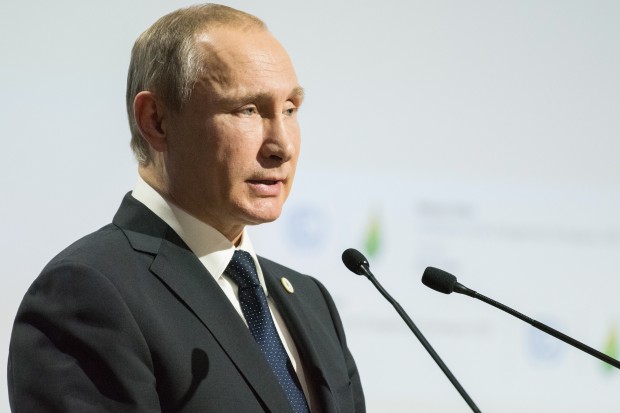
Credit: Shutterstock / Frederic Legrand – COMEO
Before 24 November, Turkey was described in Russian news reports as a reliable partner in ambitious projects (TurkStream pipeline, construction of Sochi’s Olympic venues), a source of fruits and vegetables in a period of European food embargoes and Crimea blockade, and one of the main tourist destinations, visited annually by over three million Russians.
But after the downing of the Russian fighter jet, Turkey became the target of a new information war. Reports on estimated growth of turnover and perks at Turkish resorts in Russian state-run media were replaced by a long list of accusations.
Dmitry Kiselev, the head of a state international news agency Rossiya Segodnya and the anchorperson of a weekly programme Vesti Nedeli accused Turkey of buying oil from the Islamic State, exporting carcinogenic vegetables to Russia and trying to revive the Ottoman Empire. Vladimir Soloviev, a popular anchorperson on television channel Rossiya 1, labeled Turkey a sponsor of terrorism.
All media platforms, directly or indirectly controlled by the state, were used in the construction of an image of a new enemy. The past was revised by articles, recalling a long history of Russian-Turkish wars and crimes of the Ottoman Empire. The future was programmed by analysing chances in a possible third world war. Coverage of current affairs has become far from unbiased. News selection has been focused on demonstration of Russia’s sanctions effects and Turkey’s internal problems — oppression of journalists, a growth of child marriage and crime.
After weeks under information attack, on 3 December, Turkish Prime Minister Ahmet Davutoglu dismissed the allegations by Russian media as “lies of this Soviet-style propaganda machine”.
“In the Cold War period, there was a Soviet propaganda machine. Every day it created different lies. Firstly, they would believe them and then expect the world to believe them. These were remembered as Pravda lies and nonsense,” he said.
Days later the Russian state news agency RIA Novosti proved his point by using a classic Soviet propaganda trick. In an op-ed that called Davutoglu “Reich Minister”, RIA Novosti compared the new enemy to the old by appealing to one of the most loathed images for all Russian people since the WWII – Nazi Germany.
This method, as with many others used against Turkey, has been tested and mastered during the Ukrainian crisis. Maidan activists, who later became a new elite of the country, were also labeled by Russian television channels as “fascist nationalists” and “extremists”. The technology of information war, the main propaganda mouthpieces and the image of the enemy remain the same.
On 7 December, Russian Public Opinion Research Center (VTsIOM) published the results of its survey, saying that 73% of Russian population have changed their attitude to Turkey to the worse since the downing of Su-24.
VTsiom, whose director admitted that the main clients of the center are the Kremlin and the ruling party United Russia, has been criticised for manipulation. The results of the survey are symptomatic. If the data is correct, it demonstrates that anti-Turkey propaganda works very well. If the results were rigged in favour of the Kremlin’s agenda, it shows the desirable goal of the information attack.
The day after, on 8 December, a film crew from Russia’s state television channel Rossiya 1 was detained in the Turkish province of Hatay, close to the Syrian border, and deported from the country because of “violations of regulations of work of foreign journalists in the Turkish Republic”. The Ministry of Foreign Affairs of the Russian Federation responded with harsh critiques, accusing Turkey of “a series of infringements of the rights of local and foreign journalists”.
However, in a communique by OSCE Representative on Freedom of the Media on propaganda in times of conflicts, published last year in reference to a similar case related to the Ukrainian crisis, Dunja Mijatović made it clear that censoring propaganda is not the way to counter it. The best way to neutralise propaganda is balance and accuracy in broadcasting, independence of media regulators, prominence of public service broadcasting with a special mission to include all viewpoints, a clear distinction between fact and opinion in journalism and transparency of media ownership.
A similar view was expressed in a speech by Agnès Callamard, the former executive director of ARTICLE 19, delivered at UN Headquarters in December 2014.
“Hatred needs and is fed by censorship, which, in turn, is needed to nurture incitement to the actual commission of atrocity crimes. The lesson is clear: In our efforts to prevent mass atrocities, the free flow of information and freedom of expression are ultimately are our key allies – not our enemies.”
Mapping Media Freedom
|
Russia’s takeover of Crimea has been accompanied by an ongoing process that is shrinking the space for media and freedom of speech on the peninsula. As the clampdown progressed, a majority of the independent journalists either left the disputed territory or stopped openly criticising Russian policy. At the same time, the number of alternative sources of information declined significantly.
Russian and Crimean authorities have used red tape, paramilitary violence and threats to silence independent voices and media. They have stifled freedom of information and jeopardised journalist safety.
Journalists and media professionals dubbed Crimea “fear peninsula”.
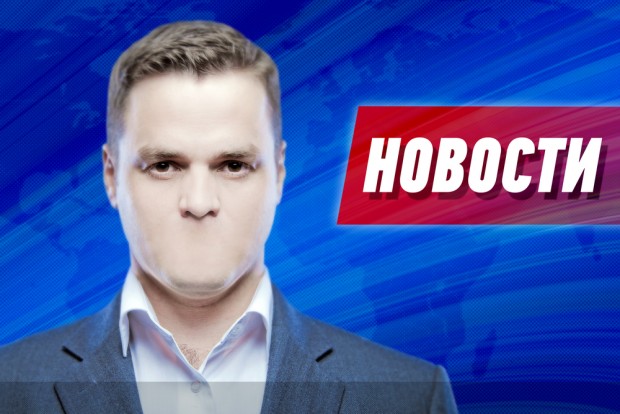
As Russia took over, television stations opposed to the annexation were one of the first targets. In March 2014, Chornomorska, the largest local TV and radio company, and all Ukrainian stations had their analogue broadcasts terminated. This was followed two months later, in June 2014, by the dropping of Ukrainian cable TV channels in some cable networks.
“#Russia also has targeted #Crimea‘s religious minorities through its notorious anti-extremism law” @AtlanticCouncil https://t.co/4a10faSBgJ
— United for Ukraine (@UnitedforUkr) October 25, 2015
Soon after the annexation, Russia began implementing its overly broad and vague 2002 law, On Countering Extremist Activity, which led to a surge in warnings against the media. In summer 2014, Shevket Kaybullaev, the editor-in-chief of the Crimean Tatar newspaper Avdet , was summoned to the office of public prosecution in Simferopol. Kaybullaev was interrogated because of a complaint against the paper that challenged coverage of the mood of the Tatar community in the run-up to local elections. The complainant accused the paper of “radicalism and extremism”.
Verbal accusations against journalists have also become day-to-day practice. The Russian Federal Security Service (FSB) and prosecutor’s offices demanded the removal of “extremist materials” from media outlets. Crimean Tatar TV channel ATR received two warnings about the “violation of legislation aimed at countering extremist activity”. The station management was reminded that the formation of an anti-Russian public opinion could be considered a violation of the extremist law.
On 9 May 2014, amendments were made to Russia’s Criminal Code. A new article, 280.1, states that “public calls for action aimed at violating the territorial integrity of the Russian Federation” is punishable by up to five years imprisonment. The words “annexation” and “occupation” are de facto banned in Crimea when referring to recent events.
The amended code has been used to target Crimean journalists. In March 2015, two journalists, the Center for Investigative Journalism’s Anna Andrievska and Natalia Kokorina, had their apartments searched. Kokorina was interrogated for six hours. The FSB opened the criminal case against Andrievska on charges of “incitement to separatism” based on her reporting on individuals providing support for the Crimea volunteer battalion fighting in Donbas, in eastern Ukraine.
MT @AtlanticCouncil: Chornomorska off air: “Kremlin Silences #Crimea‘s Last Pro-#Ukraine TV Station” http://t.co/9Sb3NdDkrr/s/ay5N #Russia — jsqwk (@jsqwk) August 8, 2014
Russian authorities are using searches and property seizure as a way to intimidate and pressurise media companies. In August 2014, the work of Chornomorska TV and Radio Company and the Center for Investigative Journalism were blocked after the seizure of their broadcasting equipment. The broadcaster wasn’t able to retrieve its equipment until five months later.
In September 2014, a search was conducted at the office of the Mejlis of the Crimean Tatar People, a representative body for the ethnic group. Because it shares the building with the Mejlis, the offices of the Avdet newspaper were also raided. Following the probe, the paper was ordered to vacate its offices within 24 hours.
In January 2015, a search was carried out at the ATR TV channel, which disrupted the station’s broadcasts and prevented newsroom staffers from reporting.
Ukraine/Україна: Far right group attacks journalists near Crimea blockade https://t.co/e2wF7KG1xu #mediafreedom #mapmf
— Index on Censorship (@IndexCensorship) November 25, 2015
Paramilitary groups have also been used to target journalists. So-called Crimean self-defense groups have been found to have illegally detained, assaulted and tortured journalists, as well as confiscations of and damage to property. From 15 to 19 May, 2014, ten cases of journalists’ rights violations were recorded and documented by the Crimea Field Mission on Human Rights. The situation has been worsened by the fact that to date not all the documented attacks on journalists by self-defense group members have been investigated by Crimean authorities. This has created an atmosphere of fear and impunity.
After the Russian annexation, Crimean authorities demanded that all active media outlets re-register according to Russian legislation. As a result, mass media that was considered disloyal — including News Agency QHA and TV Channel ATR, among others — did not receive legal permission to continue their work on the peninsula. In February 2015, all Crimean independent radio companies were silenced after losing their frequencies during a bidding process that was carried out opaquely. Beginning on 1 April 2015, the Federal Service for Supervision of Communications, Information Technologies and Mass Communications (Roskomnadzor) stopped recognising Crimean media outlets with Ukrainian registrations, making their work in the annexed territory illegal.
New rules for accreditation in Crimea make it possible to selectively restrict media access to the authorities. The State Council of the Republic of Crimea issued new regulations that make “biased coverage” one of the reasons journalists could lose accreditation. Kerch City Council, for instance, prohibits journalists without accreditation from even entering the city hall.
Crimea/Крим: Two local media outlets blocked https://t.co/OGj8G1XaIs #mediafreedom #mapmf
— Index on Censorship (@IndexCensorship) October 6, 2015
In October 2015, media freedom in Crimea came under renewed pressure when websites were blocked. Roskomnadzor carried out a request by the general prosecutor to restrict access to the Center for Investigative Journalism and Events Crimea websites in Crimea and Russia. Roskomnadzor said that the information on the sites “contains calls for riots, realisation of extremist activity and/or participation in mass (public) events held in violation of the established order”.
These internet media outlets became the first Crimean mass media whose content are officially blocked on the territory of Crimean peninsula.
|
Mapping Media Freedom
|